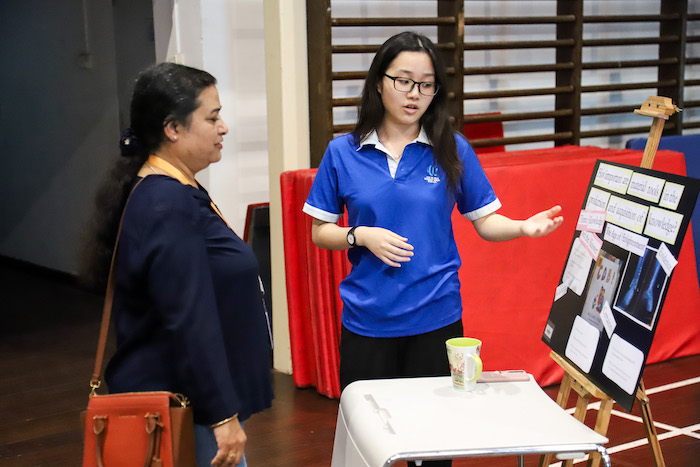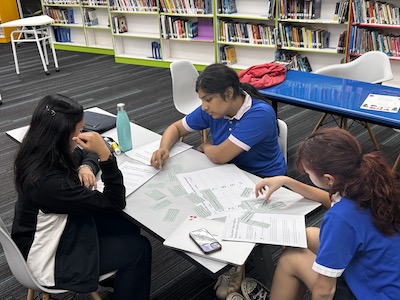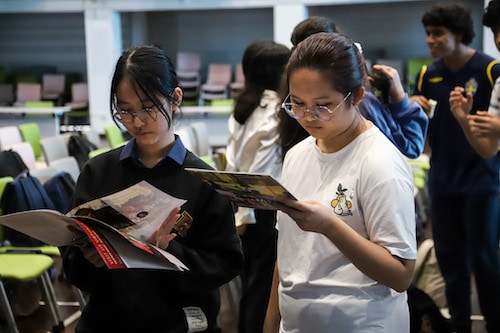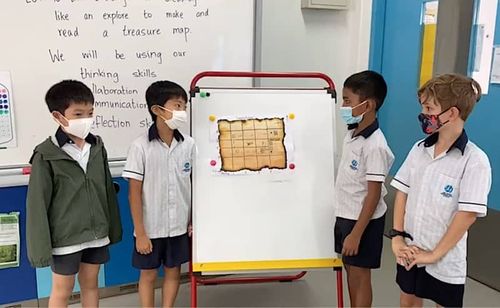The International Baccalaureate Diploma Programme, commonly referred to as the IB Diploma Programme or IBDP, is considered to be one of the top curricula for secondary students. With an emphasis on holistic education and a focus on critical 21st-century competencies, the IBDP prepares students for success both within and beyond the classroom.
Overview of IBDP
The IBDP is a two-year programme designed specifically for students who are completing secondary school and looking to head to a top-tier university. It is offered to students in Grades 11 and 12.
Known for being a rigorous and demanding curriculum, the IBDP not only emphasises academic excellence but also the critical 21st-century competencies that students need to enjoy a lifetime of success. The curriculum’s coursework and extended requirements organically foster a well-rounded skill set, including critical thinking, collaboration, communication and digital literacy skills. Beyond that, the IBDP curriculum allows students to develop a deep and lasting sense of cultural awareness that will allow them to remain competitive and relevant in a global economy.
The core elements of the IB Diploma Programme include:
Six Subject Groups
Within the IBDP, students are required to take courses across six subject groups, which are:
- Studies in Language and Literature
- Language Acquisition
- Individuals and Societies
- Sciences
- Mathematics
- Arts
The individual courses that are available within the subject groups may vary based on the international school in Singapore, but any student who is enrolled in a school that offers the IBDP will benefit from interdisciplinary subject areas and engaging coursework. As students are selecting courses, they will be required to take three subjects at the Higher Level and three at the Standard Level, allowing them to personalise their educational experience and strengthen their skill set within a specific area of interest.
Theory of Knowledge

Theory of Knowledge is a mandatory component of the IBDP, requiring all students enrolled to complete an exhibition and essay that explores the nature of knowledge and knowledge acquisition. Known to most as the TOK, this component allows students to reflect on the learning experience and become more aware of themselves as curious and engaged lifelong learners.
Creativity, Activity, Service
The IBDP aims to help students connect their newfound knowledge with real-world experience, which is where the Creativity, Activity, Service component comes into play. Frequently referred to as CAS, this core component of the IBDP requires students to participate in a wide range of experiences and complete a related project.
Students have a lot of freedom when it comes to planning and implementing their CAS project. The IBDP simply requires that their project involve:
- Real and purposeful activities that result in significant outcomes.
- Overcoming a personal challenge.
- Logistical planning, such as reviewing and reporting on progress.
- Reflection and evaluation after the project is complete.
Extended Essay
To effectively prepare students for more extensive academic challenges in the future, the IBDP requires students to complete a mandatory Extended Essay. The Extended Essay must be a minimum of 4,000 words and lets students launch and direct an independent writing project, which helps them hone their research skills and fine-tune their writing skills before heading to university.
How the IBDP Promotes College and Career Readiness
Designed to be a dynamic and challenging curriculum, the IBDP has long been known for its ability to prepare students for university life and beyond.
These are just a few of the ways that the IBDP at OWIS Nanyang promotes college and career readiness:
Developing Critical Thinking Skills
Modern learners need to do more than simply memorise and reiterate facts to succeed both within and outside the classroom. Critical thinking skills are considered one of the most in-demand soft skills within the global economy, and students will need to leave secondary school with a well-developed ability to think creatively and critically.
Fortunately, the IBDP naturally fosters a deeper sense of critical thinking, as students are required to look beyond the text that they are reading. Within open-concept classrooms, they can engage in discussions with their teachers and peers to analyse information and evaluate knowledge claims. These discussions include claims and counterclaims, and students must think deeper to determine what is true and how that truth is confirmed.
While critical thinking is embedded within the traditional coursework, it is amplified through the TOK component. Students spend a lot of time considering what knowledge is, how it is acquired and how we separate truth from fiction. This component forces them to think more critically and analytically than they have before, often asking them to wrestle with vague, theoretical concepts. By the time students have completed the TOK, they recognise the powerful role that critical thinking plays in any environment, whether it’s a classroom or a professional setting.
Enhancing Language Proficiency and Communication Skills
Language acquisition and analysis play a prominent role within the IBDP, and as a result, students often leave OWIS Nanyang having become fluent in one or more languages. At OWIS, we believe that students should build upon existing knowledge and become proficient with reading, writing and speaking another language. To this end, we offer language acquisition courses in a variety of languages, in the hope of meeting the unique needs of our learners.
Students at OWIS Nanyang can pursue high-level or ab initio level courses in Mandarin, Spanish or French to expand their understanding and fluency.
Language acquisition studies extend beyond fluency; they also explore different cultures and traditions within those languages, giving students a better sense of cultural awareness. Language skills can prepare students to become global citizens, and allow them to communicate effectively in any academic or professional setting.
Promoting Holistic Development Through CAS
At OWIS Nanyang, we have long recognised that the most impactful learning experiences often take place outside the classroom — which is why the IBDP aligns so perfectly with our commitment to providing all students with a holistic education.
The CAS component within the IBDP requires students to get outside their comfort zones and participate in extracurricular activities. Through CAS, students engage in projects that have meaningful outcomes and measurable results.
Examples of meaningful CAS projects include:
- Students working together to organise an event for the school community. At OWIS Nanyang, our Grade 11 students have actively contributed to Chinese New Year celebrations as well as the Graduation Gala for Grade 12.
- Students serving as mentors and coaching young children in a sport.
- Students launching a service project that will benefit their local community, such as a beach cleanup or hosting a drive to collect supplies for people in need.
The CAS component gives students the flexibility to design and implement a project that they care about, which increases their engagement and results in a memorable, long-lasting learning experience that they will carry with them for years.
Focusing on Academic Rigour and College Preparedness

All the courses across the six subject areas in the IBDP are designed to be exceptionally challenging. By presenting students with rigorous course material and engaging projects, these courses uniquely prepare students for the academic rigour of higher education. Through the IBDP courses, students learn how to study effectively on their own. They are required to follow a syllabus and work with their peers to discuss course material and create meaningful outcomes from the coursework.
With a focus on college readiness, the IBDP also emphasises the importance of research, writing and analytical skills. The Extended Essay component is essentially a culmination of all of these skills. Students must take on an independent research project and complete a wide range of analytical work to craft a compelling and thoughtful essay that spans at least 4,000 words.
This sense of independence and ingenuity will be critical in the university environment, where professors at top-tier institutions will expect students to take on projects of this magnitude regularly. While other programmes may focus on the basics of essay writing and beginner research, the IBDP provides students with a solid foundation that will allow them to launch a successful university career. Plus, these research, writing and critical thinking skills are transferable skills that are relevant in any industry and will benefit them in their professional lives as well.
Developing a Sense of International Mindedness and Global Perspectives
Today’s students are going to join a multicultural workforce, and they must be comfortable navigating their professional and personal environment. By choosing a school that is committed to cultivating a multicultural environment and selecting a curriculum that emphasises global perspectives, OWIS Nanyang students will be uniquely prepared to navigate a globalised economy.
Throughout the IBDP coursework, students will be exposed to a variety of diverse perspectives, which will help them develop a deep sense of cultural awareness. Cultural competence in the globalised economy will become increasingly important, because:
- It allows students to enter into a multicultural world feeling confident of themselves and aware of the needs of others.
- It allows students to effortlessly navigate professional spaces where they are working alongside people from different cultures and backgrounds.
- It allows students to become well-rounded adults who can see the beauty in differences and who are willing to actively listen to better understand the perspectives of others.
- It allows students to play an active role in creating welcoming environments wherever they are, whether they are in a university dormitory or a conference room with other professionals.
By emphasising and promoting global perspectives, IBDP students are poised to become aware, responsible and respectful adults who understand that our strengths lie in our ability to work together.
OWIS Alumni Success Stories
Having recently completed the IBDP at OWIS Nanyang, the 2024 graduates have a lot to say about this highly-regarded curriculum. Here is OWIS’ 2024 graduand Cathy W.’s story:
“I would like to extend my deepest gratitude and appreciation for Ms Weisha Chen, my art teacher. She has helped immeasurably in every step of the IB art process and my only wish is that she was my art teacher earlier. She knows how to not only encourage original ideas, but also helps us grow and develop our ideas. I am a better artist and feel better equipped thanks to her, and definitely wouldn’t have gotten through the IB Visual Arts programme without her and her guidance,” Cathy W. said.
“I’m planning to pursue visual arts in the future, more specifically, 2D animation. I will apply to UK and Australian universities, and have already applied to LASALLE here in Singapore.”
Learn More About the Leading International School in Singapore Today
At OWIS Nanyang, our commitment to holistic education perfectly complements the IB Diploma Programme, which prepares our secondary students for success at the university level and fulfilment outside the classroom environment.
Schedule your campus tour today, and learn more about how we implement the IB Diploma Programme at OWIS Nanyang.















